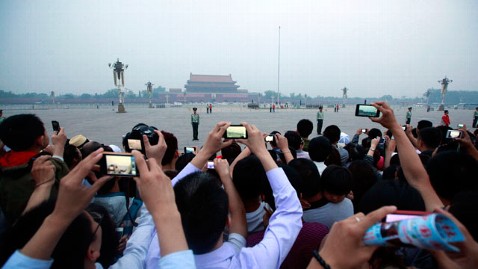Tiananmen Square Quietly Remembered 23 Years Later

Tiananmen Square
By AUDREY WOZNIAK and GLORIA RIVIERA
BEIJING - Today marks the 23rd anniversary of the Tiananmen Square massacre, but in China any mention of that day remains forbidden.
The Chinese government, which forbids any recognition of the massacre and the events leading up to it, has taken special measures in the last few days to further censor acknowledgement of the protests. Chinese micro-bloggers on the popular site Sina Weibo particularly felt the effects of censorship. Dissident posts were "harmonized" (removed) in minutes, profile pictures could not be changed, and the candle emoticon was removed.
The list of blocked words was extensive, including words, names and numbers that related to the incident from "never forget" to "tank" to "-ism." On television, the BBC's channel was blacked out during their segment on Tiananmen.
In the square on Sunday a small group of protesters were beaten and detained, Mao's mausoleum was closed, and large groups of uniformed and plainclothes police monitored the area. Today, it was quiet save for slightly heightened police presence.
However, the government hasn't been able to control all responses to the anniversary. The U.S. Department of State issued a statement acknowledging the loss of life in the massacre, and encouraging the Chinese government's protection of human rights.
The Tiananmen Mothers group called for the end of communist rule, and micro-bloggers have encouraged sympathizers to wear all black and "stroll" in public places. In Hong Kong, a temporary Tiananmen Massacre museum is open for the week, and a book reexamining the events of the Tiananmen Square protests and based on interviews with then-Beijing mayor Chen Xitong is due to be published Friday. The author, Yao Jianfu, told Reuters that Chen Xitong told him that Tiananmen was "a tragedy that should have been averted, but wasn't." The book is banned in mainland China.
After the death of pro-reform Communist Party leader Hu Yaobang on April 15, 1989, students from many Chinese universities gathered in the thousands in Tiananmen Square, calling for increased government transparency and personal freedoms.
After government negotiations failed to clear the square of protesters, who had been occupying Tiananmen for nearly two months, military forces from the People's Liberation Army took drastic action on June 4, 1989, using tanks, tear gas, and gunfire. The PLA forces opened fire into the crowds, killing what human rights organizations have estimated to be hundreds to thousands of unarmed civilians. The Chinese government has never released official death toll figures.